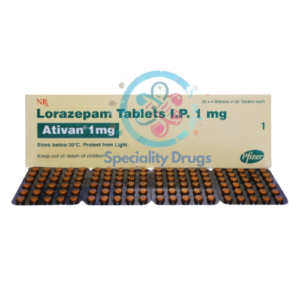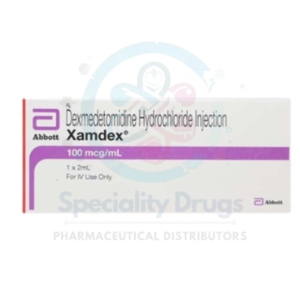What is Rifabutin Capsules IP?
Rifabutin Capsules IP is an oral antibiotic that contains Rifabutin, a rifamycin derivative. It is primarily used to prevent and treat mycobacterial infections, including tuberculosis (TB) and Mycobacterium avium complex (MAC). The “IP” designation confirms the formulation meets Indian Pharmacopoeia standards for quality, purity, and efficacy.
What is the Use of Rifabutin Capsules IP?
Rifabutin Capsules are used for:
-
Prevention and treatment of Mycobacterium avium complex (MAC) in patients with HIV/AIDS or immunocompromised individuals
-
Treatment of tuberculosis (TB), especially in cases where rifampicin resistance or drug interactions are a concern
-
Used in multidrug therapy (MDT) for TB or atypical mycobacterial infections
-
An alternative to rifampicin in HIV patients due to fewer drug interactions with antiretroviral medications
Benefits of Rifabutin Capsules IP
-
✅ Effective against mycobacterial infections, including MAC and TB
-
✅ Less interaction with antiretroviral drugs compared to rifampicin, making it suitable for HIV patients
-
✅ Well absorbed orally, allowing effective treatment in capsule form
-
✅ Can be used in combination therapy, helping to reduce resistance development
Side Effects of Rifabutin Capsules IP
Like all medicines, Rifabutin may cause side effects. Some are mild and manageable, while others may need medical attention.
Common Side Effects:
-
Nausea or stomach discomfort
-
Rash or skin discoloration
-
Diarrhea
-
Body fluid discoloration (e.g., urine, sweat, tears may turn orange or reddish)
Serious Side Effects (Seek Medical Attention):
-
Uveitis (eye inflammation), especially when used with clarithromycin
-
Neutropenia or leukopenia (low white blood cell counts)
-
Hepatitis or liver enzyme abnormalities
-
Flu-like symptoms
-
Joint or muscle pain
-
Severe allergic reactions (rare)
Precautions & Warnings
-
Use with caution in patients with liver disease or blood disorders
-
Regular monitoring of liver function and blood counts is recommended during prolonged use
-
Inform your doctor of all medicines you’re taking to avoid drug interactions, especially with antiretrovirals, macrolides, and antifungals
-
Not recommended during pregnancy or breastfeeding unless clearly needed
-
May stain contact lenses due to body fluid discoloration
Storage Instructions
-
Store below 25°C, in a dry place
-
Protect from light and moisture
-
Keep out of reach of children
-
Do not use after the expiry date
-
What is Rifabutin Capsules IP used for?
Rifabutin is primarily used to prevent and treat Mycobacterium avium complex (MAC) in HIV-infected individuals and as part of a combination therapy for tuberculosis (TB). -
How does work?
Rifabutin inhibits bacterial DNA-dependent RNA polymerase, stopping the synthesis of RNA and ultimately killing the bacteria. -
What is the usual dosage of Rifabutin Capsules IP?
The typical adult dose is 300 mg once daily, but it may vary depending on the infection and patient condition. Always follow the doctor’s prescription. -
Can Rifabutin be taken with food?
Yes, Rifabutin can be taken with or without food. However, taking it with food may help reduce stomach upset. -
What are the common side effects of Rifabutin Capsules IP?
Common side effects include rash, fever, nausea, vomiting, diarrhea, joint pain, and orange discoloration of body fluids (urine, sweat, tears). -
Can Rifabutin cause discoloration of body fluids?
Yes, Rifabutin may cause orange or red discoloration of urine, sweat, tears, and saliva. This is harmless but can stain contact lenses or clothing. -
Is Rifabutin safe in pregnancy and breastfeeding?
Rifabutin should be used during pregnancy only if clearly needed. It can pass into breast milk, so consult your doctor before use during breastfeeding. -
Can Rifabutin be taken with other TB drugs?
Yes, it is often used in combination with other anti-tuberculosis drugs. Always inform your doctor of all medications you’re taking. -
Does Rifabutin interact with antiretroviral drugs?
Yes. Rifabutin interacts with several HIV medications, especially protease inhibitors and non-nucleoside reverse transcriptase inhibitors. Dose adjustment may be required. -
How long should Rifabutin be taken?
Treatment duration depends on the condition being treated. For MAC prophylaxis, it’s long-term; for TB, it could be several months. Follow your doctor’s guidance. -
What should I do if I miss a dose?
Take the missed dose as soon as you remember. If it’s almost time for the next dose, skip the missed dose. Do not double the dose. -
What should I avoid while taking Rifabutin Capsules IP?
Avoid alcohol and contact lenses (due to staining). Let your doctor know before taking any new medications or supplements. -
Can Rifabutin cause liver problems?
Yes, Rifabutin may affect liver function. Regular liver function tests may be recommended during treatment. -
Is Rifabutin an antibiotic?
Yes, it is an antibiotic from the rifamycin class, used to treat mycobacterial infections. -
Can Rifabutin be used for active TB in HIV patients?
Yes, it’s preferred in HIV-positive patients with TB, especially when rifampicin cannot be used due to drug interactions.






Reviews
There are no reviews yet.